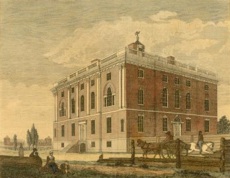
In 1779, when the school was rechartered and empowered to grant the degree of Bachelor of Arts, a "new" curriculum was put in place, although in practice there were only somewhat minor changes to the former course of study, which remained basically intact well into the 19th century. Just as was true in most American colleges, Greek and Latin were central elements in the Penn curriculum. In addition, students took courses in mathematics, moral philosophy, German, oratory, and English.
The pattern of academic life at the College is described in a letter written by William Temple Franklin, Benjamin Franklin's grandson, to his father. As a member of the Junior Class, Franklin explained that for three mornings a week, he studied Latin and Roman history. The remaining three mornings, he attended classes in Geography. Between eleven in the morning and three in the afternoon, Franklin learned Euclid's Elements and was instructed in Mathematics from three until five.
By 1830, admission to the Freshman class required a substantial knowledge of Latin and Greek. According to a College bulletin of that date, candidates for admission must be qualified for examination in the following subjects and authors:
- Latin.— Caesar, Virgil, Sallust, Odes of Horace.
- Greek.— New Testament, the Four Gospels, Acts, and the Epistles of Peter. Xenophon, the first three books. Graeca Minora, or Jacob's Greek Reader.
- Quantity and scanning in each language.
- Arithmetic, including fractions and extraction of roots.
- The elements of English grammar and of modern geography.
In addition, courses of instruction in the College at that time continued the study of Greek, Latin, and related subjects during all four years:
| Year 1: | Horace, (Odes reviewed and Satires.) Graeca Majora, Vol. 1 Epictetus Latin and Greek exercises Roman and Grecian antiquities |
Year 2: | Cicero (de officiis et de oratore) Terence. Cicero's Orations Horace's Epistles Graeca Majora, Vol. I completed Homer's Iliad Latin and Greek exercises |
| Year 3: | Art of Poetry Juvenal Perseus Livy Graeca Majora, Vol. 2 |
Year 4: | Former authors reviewed or completed Longinus Tacitus |
It is also interesting to note that the cost of this education was $25 per term, "payable in advance"; that "modern languages are taught by approved instructors, at a moderate additional expense", and that "Proper boarding, including washing, &c. can be had in the city, for from $ 2 1/2 to $ 3 per week."


 Department of Classical Studies
Department of Classical Studies